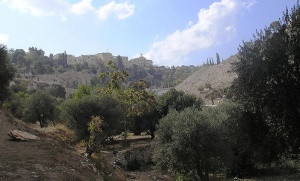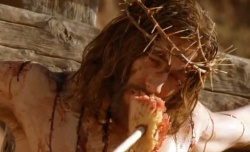Shame, Shit and Jesus
|
Human excrement is mentioned a number of times in the Bible. Some of it relates to prophecies about Jesus.  The Shame of Jerusalem:Old Jerusalem was a walled city with many gates. At the southern end of Jerusalem, at the lowest part of the city, is the Dung Gate. The Dung Gate once carried refuse from the city down into the Valley of the Son of Hinnom. It was in this valley that the Israelites sacrificed their children to pagan gods (causing them to “pass through the fire”) and built their high places. It is because of this history that the Hinnom Valley is often typed to hell. All of Jerusalem’s evil seemed to flow here, both natural and spiritual. Paul said that “when I would do good, evil is present with me”. Evil belongs with us just like the dung pile belonged to Jerusalem. Dealing with this filth is a daily exercise, because our worst evil comes from within us. The Unclean Bread God told the prophet Ezekiel to make bread, and he gave him a specific recipe. In the scriptures, bread often represents the body of Jesus Christ. This parallel seems to work until God tells Ezekiel to take his own dung, and add it to the bread. This is too disgusting for Ezekiel, and he tells God that won’t do it, because he has never eaten anything “unclean”. So God relents and lets Ezekiel add cow manure to the recipe instead. Paul said that his own effort to keep the law was "dung". When we try to secure our own salvation (eternal health) by adding our own works to Jesus’ sacrifice, we are only disrespecting a perfectly good recipe. Every person has the potential to really mess things up with self-righteousness. A Facial For PriestsThe prophet Malachi outlines a curse for priests that deceive, and do not give glory to the name of the LORD. These priests are told that God will “corrupt your seed, and spread dung upon your faces, even the dung of your solemn feasts; and one shall take you away with it.” One of the reasons God is not happy with these priests is because they say, “everyone who does evil is good in the sight of the LORD”. While God called Ezekiel to eat manure, he cursed the priests to wear it. The prophet Isaiah calls our own righteousness "filthy rags”. Today, you might call your own righteousness “toilet paper”. So when we try to remain clean through our own obedience to the law, we are only proudly covering ourselves in our own filth when we present ourselves to the Lord and to his people. The Roman Soldier and the Wine In the hours before his death, soldiers hit Jesus, spit on Jesus, scourge Jesus, ridiculed Jesus, put thorns on his head, forced him to carry his cross, nailed him to the cross, and gambled over his clothes. Every soldier in this story carried out unjust punishment on Jesus. Then, just before Jesus died, he said “I thirst”. A soldier heard Jesus, and dipped a sponge in wine and extended it on a stick for Jesus to drink. So was the soldier with the wine being kind? Was he the one exception to the rule of judgement, when he extended a drink to the beaten savior? The answer is that the soldier was humiliating Jesus. A sponge on a stick was the Roman equivalent of toilet paper, which they would place in a disinfecting liquid like vinegar or cheap wine between communal uses. That is why the soldiers had a vessel full of cheap wine and a sponge on the hill in the first place. “To fulfill the scripture”, Jesus took the curse intended for the priests on himself. When the Roman soldier shoved his own shit in Jesus' face, he added human excrement to the recipe of the bread of life that God sent from heaven. And with that, Jesus became Jerusalem’s Dung Gate. He took all of our evil, iniquity, and sorrow into himself, as well as the judgment and curse for that evil. Looking down from Golgotha, Jesus would have seen Jerusalem, and perhaps the Hinnom Valley in the distance. His last experience was to taste the dunghill - hell on earth. Jesus cried “It is finished”, with our shame on his lips. Then, with his last breath, took your shame to hell in his own embrace.
God loves you, a lot. If you have ever experienced shame: Jesus came down to your level. If you have ever caused shame: Jesus said, “Father, forgive them; for they know not what they do.” That is the righteousness of God in Christ. Let’s admit it. We can't save ourselves. We are too full of it. We need a savior - someone who can cleanse us. And it is by God's miraculous grace that we are saved through faith in the sacrifice of Jesus Christ. We are not saved by our own works – we only tarnish God’s good plan when we add our own self-righteousness to the recipe. When we focus on our own works, we end up “eating and drinking damnation…not discerning the Lord’s body”. Let’s step aside, and appreciate the depth of Jesus’ sacrifice. Jesus didn't have to die for you, but he did. He didn't have to take your shame, but he loves you. References
|